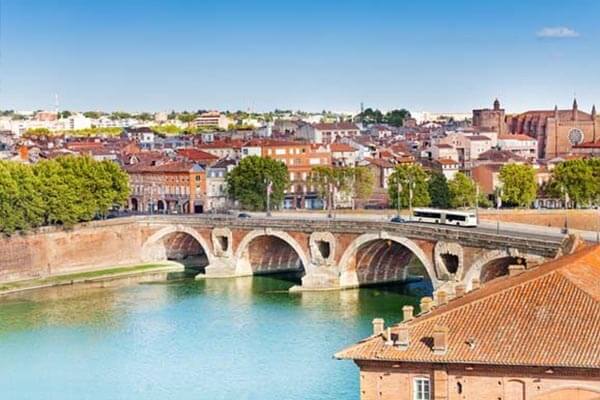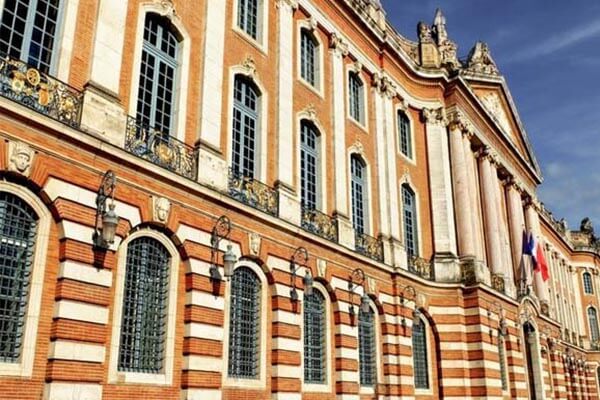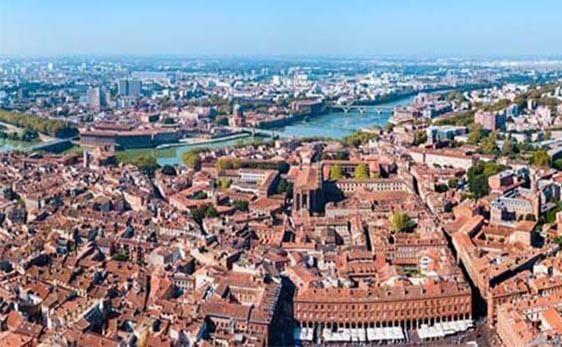An Elegant South-of-France Lifestyle in Beautiful Toulouse
Written by Tuula Rampont
Its larger cousins to the north, Paris and Lyon, once overshadowed the capital of the Occitanie region in southwestern France, Toulouse. But thanks to a boom in industry (aeronautic and aerospace at the forefront) it has become one of the most vibrant cities in the country.
Located halfway between the Atlantic and Mediterranean Sea, and a stone’s throw from the Spanish border, Toulouse has a very open and lively culture, hosting some 1,000 events on average every year. There’s always a good excuse for a “fiesta”, and given that the city is a foodie-destination par excellence, a lot of the town’s social life centers around gourmet activities. Residents take pride in their regional products and wines, and Toulouse boasts 11 Michelin-star restaurants.
Toulouse’s center is a colorful maze of pedestrian squares, neighborhood markets, cafés, and historic monuments—churches, theaters, and the majestic Capitole “town hall”. The Garonne River bisects the city, and along with the Canal du Midi, provides many opportunities to enjoy outdoor activities like walking, cycling, fishing, kayaking, and river-cruises. There are also around 160 parks and green spaces around Toulouse.
The second largest university city, after Paris, students account for one-fourth of the city’s population. This youthful spirit is felt throughout town, as well as a passion for the arts that is seen through Toulouse’s numerous museums, theaters, and concert halls.
The region also enjoys a mild, temperate climate with sunshine throughout the spring, summer, and fall months. The lowest temperatures in the winter average around 40 F with highs reaching into the 80s F during the summer months.
Retire in Toulouse, France

The southwestern area of France, and particularly Toulouse, is a very attractive option for retirees. Not only is France known for its high standard of living and quality healthcare system, but it also offers myriad activities for its residents; cultural, gourmet, intellectual pursuits, hobbies and crafts, and sports to name a few.
This is especially true in the Midi-Pyrenees region. Toulouse and its surrounding areas provide enough free time activities to last a lifetime. There are sightseeing opportunities within the city and surrounding villages, and many museums, exhibitions, concerts, cultural events, and lifelong learning opportunities. French lessons for adults exist through the organization Alliance Française and at two local universities: Université du Mirail and Université Paul. Retirees can join the very active and knowledgeable expat group: Americans in Toulouse. They publish a newsletter about the goings on around town and host an excellent website that helps newcomers with everything from setting up house to understanding electricity bills.
A typical day in Toulouse might start by sharing a coffee with friends at the Capitole square, followed by a shopping trip to one of the local indoor or outdoor farmer’s markets. You may opt to prepare lunch at home, picnic along the Garonne River, or eat at a local French bistro. Some nice dining options include Une Table à Deux and Au Petit Bonheur. In the evening, you can take in a concert, enjoy a free lecture series, stroll along the Canal du Midi, or check with the Toulouse Tourism office to find out what events are taking place.
Several pubs and bars exist in Toulouse for those wanting a chance to get to know fellow English-speakers. The London Town, Mulligans Irish Pub, and The Frog & Rosbif are fun ways to spend the evening over a pint and a bit of “pub grub”. There are many crêperies, like Crêperie le Menhir, which offer budget meals and a nice, relaxed spot for meeting friends and family.
Retirees can also participate in walking, hiking, or water sports along the Garonne or the Canal du Midi. Trips to local lakes and to the Pyrenees Mountains are popular activities, as well as weekend trips further afield to beach towns on the Mediterranean coast.
Lifestyle in Toulouse, France

As with many cities in Southern France, life in Toulouse is lived largely in the cafés, squares, and green spaces that inhabit the city. The area’s mild and sunny climate is one of the top benefits of living in the Midi-Pyrenees region, and residents love to make the most of it—especially during the spring and summer months. The festival season kicks off with the Fête de la Musique, held annually on June 21 where the streets are full of mini-concerts, street musicians, and instruments of all kinds. Later in the season in July there is the jazz festival at Marciac and the Gaillac Fête du Vin, wine festival, in August.
Toulouse is truly a city for music lovers. With an opera house, concert halls, and dance companies, there is always an opportunity to immerse yourself in the arts. L’Orchestre Symphonique du Capitole de Toulouse is well known on the international scene.
Sports-enthusiasts will enjoy watching Toulouse’s winning rugby team who have been French national champions many times over. Football, tennis, and canoeing are other popular sports practiced in Toulouse.
All of these activities and events take place in a very “livable” city. You can easily walk from neighborhood to neighborhood in the historic center, and if you’d like to cycle across the old town, it will take you around 10 minutes. Toulouse has made a substantial investment in updating and modernizing its public transport, and maintains a tramway, metro, and bus lines that intersect the city. A “mobibus” and shuttles exist for residents with reduced mobility.
Many other attractive cities and villages exist near Toulouse, which can make for nice day out or weekend trips. On the banks of the Tarn River, you’ll find the beautiful city of Albi (about 50 miles northeast of Toulouse) known for its truffle market and picturesque village streets. The fortified medieval city of Carcassonne is about an hour’s drive away and one of the must-sees for the area. You’ll also find important wine-growing appellations in the city of Cahors and Gaillac. A world-famous religious site, the town of Lourdes is a one-and-a-half-hour drive from of Toulouse.
Cost of Living in Toulouse, France

As one of France’s larger cities, Toulouse offers diverse housing opportunities for every taste and budget. You can rent an apartment in the historic center of town—in a beautifully restored building shaped in the neoclassical style or in a modern apartment block with all of the accompanying amenities. You can likewise buy a charming French “condo” to renovate or one that has already been updated to modern tastes—with intact ironwork or a stone-laid chimney.
In the city center, you’ll be close to all cultural activities, small food shops, and outdoor markets, and you can easily get around on foot or use public transport. The drawbacks are that prices are generally higher in the old town section and you might not have a garden or outside space.
You can rent a furnished, two-bedroom, one-bathroom, 750-square-foot apartment in the center of Toulouse for $1045. If you’re looking to buy, prices start at $275,000 for a two-bedroom, one-bathroom, 750-square-foot apartment with a balcony.
Toulouse has numerous suburbs that are accessible by bus or car. Some of the advantages of living further afield are lower housing prices, more modern developments (homes in sub-divisions), and the ability to be closer to larger shopping areas. On the outskirts of Toulouse, a furnished, two-bedroom, one-bathroom, 800-square-foot apartment will run you about $929.
Some expats choose to go even a bit further out, renting or purchasing in the villages that surround Toulouse. These villages are attractive for several reasons and have growing English-speaking expat populations. Here you’ll experience real French “country living” and your dollar will go quite a bit further. Popular villages to settle in near Toulouse include Pibrac, Tournefeuille, and Colomiers. The price for a two-bedroom, one-bathroom, 1045-square-foot village house (with a terrace and garden) is $243,000 in Colomiers.
Like most cities of its size in France, Toulouse offers a multitude of choices when it comes to shopping, dining, and entertainment. You don’t need an impressive budget to live well in France as the French, in general, are very careful with their money and tend shop as such. Shops, restaurants, and outdoor markets reflect this tendency—prices are rarely inflated, as merchants understand that their customers will look elsewhere.
In Toulouse, you could eat in the finest restaurants and pay top dollar for your groceries—those possibilities do exist throughout the city. On the other hand, you can also live very well on a moderate, or even slim, budget by taking advantage of the low-cost options that exist.
The best choices for food shopping are the farmer’s markets throughout Toulouse. The key is to avoid the touristy areas and shop where the locals shop. Here, you’ll find the freshest local products for the best prices around. Vegetables—zucchini, green peppers, tomatoes, and onions are around $1.60 a pound. A head of lettuce is about $1.20. Apples go for about $1.40 and, in the summer months, apricots and peaches are in abundance for around the same price per pound. Melons are about $1.80 during the high season. Baguettes in any local bakery are sold for about $1.00.
French bistros are always the best choice for dining options. You can get a two-course meal for around $14 to $16 dollars—usually with a glass of wine included. Those are lunchtime prices, so evening meals will run you a bit more. Tipping is not a common practice in France, so that will be your “out-the-door” price. If you’d like to “splurge” on a gourmet meal, a three-course dinner starts at around $42. This will include a starter, main dish, and dessert. Wine will be extra at about $17 for a truly excellent bottle. Cheaper wine options exist, and you can order by the glass as well at around $6 to $9 depending on the restaurant and wine selection.
Here are a few examples of basic monthly costs for a couple living in Toulouse:
| Expense | U.S. $ |
| Rent | $930 to $1,225 |
| Groceries | $425 |
| Cable TV | $30 |
| Internet | $45 |
| Water | $40 |
| Electricity | $90 |
| Phone | $50 |
| Entertainment/Eating out | $350 |
| Transportation | $46 |
| Healthcare | $170 |
| Monthly Total | $2,176 to $2,471 |
10 Things to Do in Toulouse
Toulouse, the fourth largest city in France, is known as La Ville Rose (the Pink City) because of the reddish-bricks which were used to construct many of its buildings and which give the city its trademark “pink” appearance. A vibrant, culturally dynamic destination in the Midi-Pyrenees area of the country (southwestern France), Toulouse is the capital of the Occitanie region and sees both French and Spanish influences in its cuisine and lifestyle.
A visit to Toulouse is a chance to pique all of one’s senses. The historic center represents a study in photo ops, with beautiful historical landmarks like the Capitole Square, considered one of the prettiest pedestrian spaces in Europe, and the Basilique Saint Sernin—the largest surviving Romanesque church in Europe and a UNESCO World Heritage site.
Adding to the city’s allure, the Garonne river runs directly through Toulouse and branches off to the Canal du Midi—a favorite for travelers and day-trippers alike. Gifted with a cuisine rich in the flavors of southwestern France, any city tour also merits sampling traditional dishes like Cassoulet, duck confit, and Toulousain sausage.
This guide will give you the highlights and must-dos of La Ville Rose and planning tips for a visit to this South-of-France gem.
Experience the Heart of Toulouse at Capitole Square

This impressive square, surrounded by 17th and 18th century buildings, is the seat of government of Toulouse. The majestic Capitole building, unmistakable from its central vantage point, is the home of the city’s town hall and houses a theater and state rooms. The interior of the Capitole warrants a visit as the halls are richly decorated with paintings by artists Henri Martin and Paul Gervais. The upper floor contains a painting-series that recounts the history of the city itself. Aside from its artistic value, Capitole Square is the central meeting-spot of Toulouse. Lined with bistros, cafés, and boutiques, it’s a place to see and be seen—all while enjoying a leisurely lunch, trying one of the region’s red wines, or simply chatting with friends over a café au lait. As beautiful at nighttime as during the day, the square is an excellent choice for dinner after a long day of sightseeing.
Shop with all Your Senses at the Victor Hugo Market

As with most French cities, each neighborhood in Toulouse has its own market and an afternoon shopping tour is a great way to experience the local cuisine. One well-known market, where you’ll find all of the regional specialties, is the Victor Hugo market situated in the center of town. An indoor market, Victor Hugo has been around since 1896 and has over 86 merchants and culinary stands. Here you can find bakers, cheese makers, charcuterie dealers (cold cuts and Parma ham), wine merchants, fruits and vegetable sellers, and even a pizzeria. Stop by the well-known Garcia stand to learn about the delicate process used to age ham that was brought from Spain, and perfected in Toulouse.
https://www.marche-victor-hugo.fr/
Enjoy a Picnic at Jardin des Plantes

While Capitole Square highlights the cultural side of Toulouse, the Jardin des Plantes reflects the city’s passion for nature. Located southeast of the historic center, the Jardin is home to a large botanical garden and is bordered by the Natural History museum and the Saint-Exupère church. The park is a popular gathering place for Toulousains and their families, and with the Canal du Midi at its outer limits, it makes a great spot to have a picnic. Collect your provisions for the day from the Victor Hugo market and enjoy some of the sunny weather for which Southern France is famous.
Take a Bike Ride Along the Canal du Midi

The Canal du Midi dates from the 17th century and spans 150 miles through southwestern France to the Mediterranean Sea. Tourism along the canal is largely centered around “slow-boat” tours where holiday-goers can take in the French countryside at a leisurely pace. Rowing, canoeing, fishing, and biking along the canal banks are all popular activities for locals and tourists alike—allowing for a quick escape from city-life and a chance to enjoy the beautiful landscape on the outskirts of Toulouse.
Spend the Night on a Péniche

Everyone loves staying at a B&B, and France’s equivalent, the “chamber d’hote” is as fancy as they come. But what about staying on a floating B&B, a houseboat? Not only is the Canal du Midi an excellent way to enjoy nature and take a pause from city-life, but you can prolong your peace and quiet by staying on a houseboat (called a péniche in French). Owners provide an overnight stay and breakfast, along with anecdotes about the boat’s origins and stories about daily life on the Canal. Bring your bike along and you’re just a short ride back into Toulouse the next day. One well-noted B&B to try is Péniche Soléïado.
http://www.plan-canal-du-midi.com/chambres-dhotes/?type=chambre-hote
Take in the Splendor of the Basilique Saint Sernin

Constructed between 1080 and 1120, the Basilique is the largest remaining Romanesque building in Europe and became a UNESCO World Heritage sites in 1998. Noted for the quality of its Romanesque sculptures, other striking features include its impressive bell tower and spire, which was built in the 15th century. The most significant monument in the historic center of Toulouse, the Basilique Saint Sernin is on the pilgrimage route to Santiago de Compostella.
Be Whisked Away to Space City—Cité de l’Espace

If you’re interested in space travel or exploring the great beyond, than the Cité de l’Espace is a must-do on any visit to Toulouse. A 26,000 square-foot theme park, Space City includes life-sized replicas of spacecraft, giant telescopes, and interactive learning activities for young and old alike. Try on a space suit, learn how astronauts live in space, or take the moonwalking simulator for a spin. An IMAX® cinema, which gives visitors sensory visits of the solar system, planets, and space missions, rounds out the park’s offerings. The Cité de l’Espace is located on the eastern side of Toulouse.
Indulge in a Hearty Bowl of Cassoulet

If it’s one thing that Toulouse is known for, it’s the rich dish known as Cassoulet. Although Cassoulet is found in other parts of France, it’s the Toulousain version that most comes to mind in the hearts, and stomachs, of most Frenchmen. The ultimate “comfort food” of the Midi-Pyrenees, the bean-based dish is made up of pork shoulder, ham hocks, duck fat, and white beans (with a few vegetables thrown in for good measure). Best served with a nice glass of red wine, good pairings include Cahors, Medoc, Côtes du Roussillon, or Côtes du Rhône Villages.
Admire the Garonne River from its Docks and Bridges

Sometimes it’s best to follow the habits of the locals and, when visiting Toulouse, you’ll find that residents love to spend time along one of the city’s most treasured features—the Garonne River. Notably, Saint-Pierre square provides one of the prettiest vantage points, with a view of the Dôme de la Grave (focal point of the chapel Saint Joseph de la Grave) visible across its banks. A customary route is to walk from Saint-Pierre square to the docks of La Daurade while admiring some of Toulouse’s legendary stone bridges like le Pont Neuf. In the evening, the dock area “comes alive” as numerous bars and restaurants can be found along its banks.
Get to Know Toulouse’s Cultural Side

Toulouse’s rich cultural life is felt throughout the city and many venues exist to spend a memorable night out. Take in a comedy show, singing act, opera, or theatrical production in the historic center. The Capitole building has its own theater, and other well-known venues include: Café-Théâtre Les 3T, Café Théâtre Les Minimes, and Metronum.
Feature image copyright: ©Saiko3p/iStock

